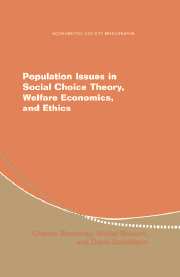Book contents
- Frontmatter
- 1 Introduction
- 2 Measurement of Individual Well-Being
- 3 Welfarist Social Evaluation
- 4 Fixed-Population Principles
- 5 Population Principles
- 6 Characterizations and Possibilities
- 7 Uncertainty and Incommensurabilities
- 8 Independence of the Existence of the Dead
- 9 Temporal Consistency
- 10 Choice Problems and Rationalizability
- 11 Applications
- References
- Author Index
- Subject Index
7 - Uncertainty and Incommensurabilities
Published online by Cambridge University Press: 05 January 2013
- Frontmatter
- 1 Introduction
- 2 Measurement of Individual Well-Being
- 3 Welfarist Social Evaluation
- 4 Fixed-Population Principles
- 5 Population Principles
- 6 Characterizations and Possibilities
- 7 Uncertainty and Incommensurabilities
- 8 Independence of the Existence of the Dead
- 9 Temporal Consistency
- 10 Choice Problems and Rationalizability
- 11 Applications
- References
- Author Index
- Subject Index
Summary
Part A
In this chapter, we investigate several variations on our basic model. First, we incorporate uncertainty and extend our characterizations of the critical-level utilitarian (CLU) and number-sensitive critical-level utilitarian (NCLU) classes of population principles. The resulting classes are called ex-ante CLU and ex-ante NCLU.
Our theorems are variants and extensions of Harsanyi's (1955, 1977) well-known social-aggregation theorem. Additional axioms are used to extend fixed-population principles to the variable-population environment. Although Harsanyi used a single-profile setting, we investigate the multi-profile case but note that the single-profile approach could be extended to the variable population model as well.
Second, we examine incommensurabilities in social rankings by employing social-decision functionals, which associate a quasi-ordering (rather than an ordering) on the set of alternatives with each utility profile. Several new axioms are used to characterize the critical-band generalized utilitarian class of principles. The band is an interval and, according to those principles, one alternative is at least as good as another if and only if it is at least as good according to critical-level generalized utilitarianism for all critical levels in the band.
UNCERTAINTY
The principles presented and discussed in Chapters 3 to 6 can be used to rank actions or combinations of institutional arrangements (including legal and educational ones), customs, and moral rules, taking account of the constraints of history and human nature. If each of these leads with certainty to a particular social alternative, they can be ranked with any welfarist principle. This approach does not make a strong distinction between ends and means: actions are embedded in the associated alternatives.
- Type
- Chapter
- Information
- Publisher: Cambridge University PressPrint publication year: 2005



